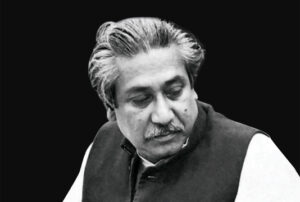Dr. M. S. HaqPoet Kazi Nazrul Islam is national poet of Bangladesh. His 114th birthday was 25 May 2013. The birth anniversary was observed in Bangladesh and elsewhere in the world in a seemingly befitting manner. Interesting though, some thoughts pertaining to his literary work against the backdrop of poet’s this year birthday, and this year’s birthday environments – meaning environments that were internalised or otherwise experienced by me via discourses, debates, songs, dramas and other programs that were held in connection with the birthday celebration – caught me in a kind of re-inventing mode.A sizeable portion of Nazrul’s work deals with freedom, liberty, change and things like that at the time when people of the subcontinent were, among other things, rising slowly but steadily above daily mundane, injustice, misrule and mistreatment, to mention a few, under British colonial rule therein – in pursuits of independent homeland or homelands for all. The critical mass of movement for independence and the critical path to independence were then clouded with or constrained by inter alia and as appropriate uncertainties, meaningful organisational, as well as directional insufficiencies and elements of hopelessness, as well as de-motivation – affecting paces and energies in favor of a fully blown independence movement leading eventually to independence. In other words, the critical mass and the critical path mentioned above were, on an average basis and as appropriate, in need of a proper boost, a solid thrust and a catalyst in pursuits of speeding up and otherwise helping the people’s journey to independnce.
The poet’s work came as inter alia inspirations and revolutionary in the midst of developments mentioned and not mentioned above. An initial and brief analysis of above work would reveal several things. A few of them have been presented here – not in the order of priority and importance but they are relative to time, space and other variables.
01. The above work represents reflex, perception, internalisation, processing, outcome making (in the form of say the revolutionary literature) and other components of Gene mechanics of Nazrul and concerned others – that were associated or otherwise connected with, action, reaction, interaction, transaction and other things between and among, as appropriate, mindsets of independence, mindsets of colonial rule, and the then existential and evolving challenges, as well as opportunities in pertinent areas, to name a few – all, under ‘fixed’, moving and other kinds of reality witnessed or experienced or otherwise as appropriate by people, rulers and others concerned of the subcontinent during the colonial period – at individual, collective and other levels within and beyond notional jurisdictions of respective thoughts, as well as ideas.
In short, the work was not merely a literary outburst in support of independence accompanied by for example revolutionary postures, as well as tones but an expression of somewhat integrated, as well as internalised rationale for independence against the backdrop of subjects, objects and other things of the people’s – particularly ordinary people’s – expectations, sufferings, complaints and visions.
02. The work has several representative characters. It represents inter alia and as appropriate a part of history of the subcontinent; a narrative on civility, as well as civilisation reflecting on positive, negative and other sides in pertinent areas of, for example, the then human development in the subcontinent; an increasingly difficult co-existence of personality of colonial rule (meaning sum total of colonial behaviors) and personality (developing) of self-rule by people of the subcontinent; and a growing sense of insecurity, deprivation and exploitation.
Nazrul was apparently successful in inter alia and as appropriate bringing in oxygen and nutrients to, and in removing carbon dioxide and wastage products from, the body of personality of self-rule through the work – based on say above and other representative characters – that acted as inter alia the canal for purposes such as bringing in oxygen to, and removing carbon dioxide from, the body of personality of self-rule mentioned above – all, in pursuits of say keeping independence movement healthy and functional. The development is somewhat similar to the Haversian system of compact bone of human body – the compact bone is strong and dense. The above system is named after English physician Clopton Havers who was first to describe Haversian canal (also known as osteon) as a prominent feature of compact bone. The system allows for effective metabolism of bone cells that are surrounded by rings of mineral salts. Kindly note: metabolism – meaning total chemical changes inside a cell – is required for a cell to maintain its structure and function.
In short, the work of Nazrul – through canal like Haversian canal – was instrumental in inter alia and as appropriate maintenance of structures and functions of independence movement that eventually led to creation of India and Pakistan, and subsequently to Bangladesh in certain ways. The independence from the colonial rule was a costly thing for people of the subcontinent. The bad news is: the subcontinent and people under for example the colonial rule had to pay costs in the form of inter alia and as appropriate: losses of life; losses of property; transfer losses of ‘quality’ DNA; sustainable livelihoods losses; losses of assets, as well as resources; losses as a result of governance related inadequacies; and losses on account of improper cultural transitions – in areas say governance and public administration.
The good news includes inter alia: developments in education, infrastructure, communication, and protection of physical integrity of the subcontinent under the colonial rule. Other pieces of the good news include inter alia the birth of conceptual, operational and other types of leaders and fighters for the liberation of subcontinent from the colonial rule and their contribution to eventual independence. My apology to all freedom fighters, leaders of freedom fighters and others concerned – other than Nazrul – for inabilities on my part to mention them individually for their good work in support of independence within limited spaces of the newspaper.
Implementation of Poet Nazrul’s remaining literary expressions and expectations – whether direct or otherwise, as appropriate – include inter alia: a full and meaningful liberation of governance and public administration in India, Pakistan and Bangladesh from harmful remains of the colonial rule therein; a continuous enlargement of choices of people of India, Pakistan and Bangladesh in areas say freedom and liberty in the presence of rights and obligations of the people at conceptual, operation and other levels; and the right and affordable justice for all at all times.
The last word: promote culture of governance and public administration conducive to 21st century India, Pakistan and Bangladesh. A UK apology is due to present generation of people of the subcontinent – India, Pakistan and Bangladesh – for say damage and losses caused to the people of past generations therein under the colonial rule. It is expected the present generation of people of the UK will become more introspective than that in the past when it comes to fulfillment of their accountability to the people of colonies under the colonial rule, as appropriate. Lift up Nazrul and his work in a proper fashion. Let the commonwealth office in London fund an integrative research project on British rule in its colonies, aiming at for example a proper intra, inter and other generational transfers in relevant areas. Let us work towards that. Respect people; eliminate wastage of scarce useful resources. God bless.
(The author is inter alia former Government Advisor, Office of the Prime Minister, Fiji – South Pacific)



